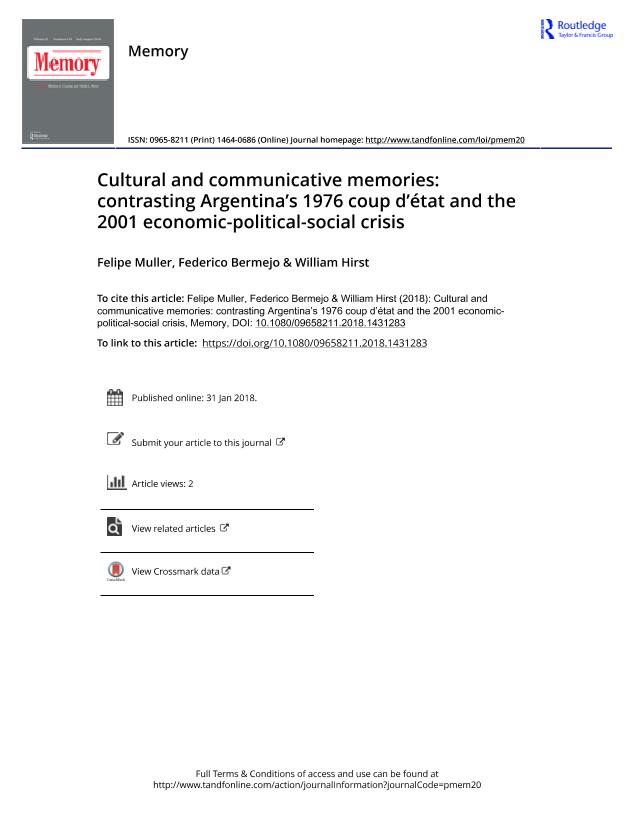Mostrar el registro sencillo del ítem
dc.contributor.author
Muller, Felipe Juan

dc.contributor.author
Bermejo, Federico Alejandro

dc.contributor.author
Hirst, William
dc.date.available
2022-11-09T17:56:12Z
dc.date.issued
2018-08
dc.identifier.citation
Muller, Felipe Juan; Bermejo, Federico Alejandro; Hirst, William; Cultural and communicative memories: contrasting Argentina’s 1976 coup d’état and the 2001 economic-political-social crisis; Routledge; Memory; 26; 7; 8-2018; 974-984
dc.identifier.issn
0965-8211
dc.identifier.uri
http://hdl.handle.net/11336/177108
dc.description.abstract
Studies on collective memory have recently addressed the distinction between cultural and communicative memory as a way to understand how the source of a memory affects its structure or form. When a groups’ memory is mediated by memorials, documentaries or any other cultural artifacts, collective memory is shaped by cultural memory. When it is based mostly in communication with other people, its source is communicative memory. We address this distinction by studying two recent events in Argentinean history: the 2001 economic-political-social crisis (communicative memory) and the 1976 coup (cultural memory). We also examine the political ideology and the type of memory involved in collective memory. The memory of the studied events may occur during the lifetime of the rememberer (Lived Memory) or refer to distant events (Distant Memory). 100 participants responded to a Free Recall task about the events of 2001 in Argentina. Narrative analysis allowed comparing these recalls with our 1976 study. Results show: 1) Cultural memories are more contextualised, more impersonal and less affective. 2) Communicative memories are more personal and affective. Study shows how collective memory form changes when it has a different prevalent source.
dc.format
application/pdf
dc.language.iso
eng
dc.publisher
Routledge

dc.rights
info:eu-repo/semantics/openAccess
dc.rights.uri
https://creativecommons.org/licenses/by-nc-sa/2.5/ar/
dc.subject
COMMUNICATIVE MEMORY
dc.subject
CULTURAL MEMORY
dc.subject
DISTANT MEMORY
dc.subject
IDEOLOGY
dc.subject
LIVED MEMORY
dc.subject.classification
Otras Psicología

dc.subject.classification
Psicología

dc.subject.classification
CIENCIAS SOCIALES

dc.title
Cultural and communicative memories: contrasting Argentina’s 1976 coup d’état and the 2001 economic-political-social crisis
dc.type
info:eu-repo/semantics/article
dc.type
info:ar-repo/semantics/artículo
dc.type
info:eu-repo/semantics/publishedVersion
dc.date.updated
2022-11-09T11:19:22Z
dc.identifier.eissn
1464-0686
dc.journal.volume
26
dc.journal.number
7
dc.journal.pagination
974-984
dc.journal.pais
Reino Unido

dc.description.fil
Fil: Muller, Felipe Juan. Universidad de Belgrano. Departamento de Investigaciones; Argentina. Consejo Nacional de Investigaciones Científicas y Técnicas; Argentina
dc.description.fil
Fil: Bermejo, Federico Alejandro. Universidad de Belgrano. Departamento de Investigaciones; Argentina
dc.description.fil
Fil: Hirst, William. The New School University; Estados Unidos
dc.journal.title
Memory
dc.relation.alternativeid
info:eu-repo/semantics/altIdentifier/url/https://www.tandfonline.com/doi/abs/10.1080/09658211.2018.1431283
dc.relation.alternativeid
info:eu-repo/semantics/altIdentifier/doi/http://dx.doi.org/10.1080/09658211.2018.1431283
Archivos asociados
